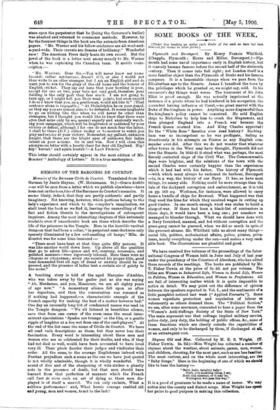MEMOIRS OF THE BARONESS DE COURTOT.
Memoirs of The Baroness Cecile de Courtot. Translated from the German by Jessie Haynes. (W. Heinemann. 9s.)—Grave doubts —as will be seen from a letter which we publish elsewhere—have been cast on the bonafides of the Baroness de Courtot's memoirs. It seems likely, indeed, that they are partly authentic and partly imaginary. Not knowing, however, which portions belong to the lady's experience and which to the compiler's imagination, we ahall treat the book as we find it, leaving the unravelling of the fact and fiction therein to the investigations of subsequent inquirers. Among the most interesting chapters of this extremely readable even if unauthentic book are those which describe the
life of the prisoners in the Temple. Here in the horrible vaulted dungeon that had been a cellar," in perpetual semi-darkness only sparsely illuminated by a few evil-smelling oil lamps," Mlle. de Courtot was for some time immured :— "There must have been at that time quite fifty persons. It was like another world down here. Up above all the qualities that go to adorn life—grace and wit, courtesy, reverence, and polished manners—were rigorously tabooed. Here there were no eitoyens or citoyennes ; every one received his proper title, good tone demanded that all sign of dread or anxiety should be re- pressed, and the presence of ladies lent a certain air of gaiety to the scene."
A touching story is told of the aged Marquise d'Amblas, who was taken away by the gaoler just as she was saying " Ah, Mesdames, and you, Messieurs, we are all eighty years of age now." "A momentary silence fell upon us after her departure, and then the conversation was resumed as if nothing had happened,—a characteristic example of the French capacity for making the best of a matter however bad." One day an unusually long list of condemned names was read in the Temple dungeon. "We all listened in breathless silence, save that from one corner of the room came the usual inter- mittent ejaculations 'Spades are trumps' or the like, or a gentle ripple of laughter at a bon mot from one of the card-players." At the end of the list came the name of Cecile de Courtot. We have all read such descriptions as these, but they never lose their fascination. Every word is interesting about these men and women who are so celebrated for their deaths, and who, if they had not died so well, would, have been accounted to have lived very ill. Their pluck dazzles their judges and vindicates their order. All the same, to the average Englishman imbued with Puritan prejudices such a scene as the one we have just quoted is not wholly admirable, though it is wholly wonderful. The sound of dice and of the sharpening of wits strikes a ghastly note in the presence of death, but that men should have learned from that perfection of manners which the French call l'art de vivre such an art of dying as these men dis- played is of itself a marvel. We can only exclaim, What a sublime performance ! and, What heroic courage enabled old and young, men and women, to act to the last !






































 Previous page
Previous page